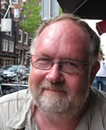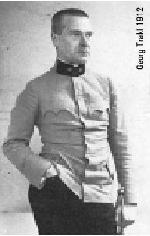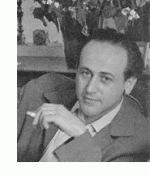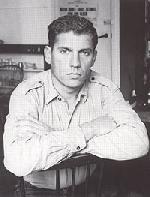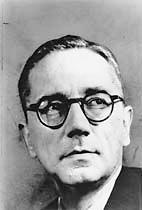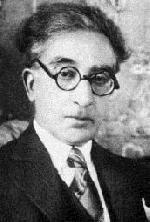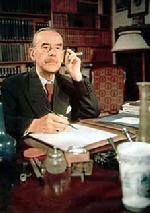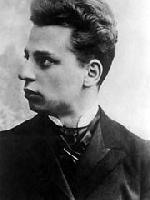De Engelse dichter en schrijver Robert Graves werd geboren in Londen (Wimbledon) op 24 juli 1895. Zie ook alle tags voor Robert Graves op dit blog.
In the Beginning Was a Word
The difficulty was, it was
Simple, as simple as it seemed;
Needing no scrutinizing glass,
No intense light to be streamed.
Upon it. It said what it said
Singly, without backthought or whim,
With all the strictness of the dead,
Past reason and past synonym.
But they, too dull to understand,
Laboriously improvised
A mystic allegory, and
A meaning at last recognized:
A revelation and a cause,
Crowding the cluttered stage again
With saints’ and sinners’ lies and laws
For a new everlasting reign.
Recalling War
Entrance and exit wounds are silvered clean,
The track aches only when the rain reminds.
The one-legged man forgets his leg of wood
The one-armed man his jointed wooden arm.
The blinded man sees with his ears and hands
As much or more than once with both his eyes.
Their war was fought these twenty years ago
And now assumes the nature-look of time,
As when the morning traveller turn and views
His wild night-stumbling carved into a hill.
What, then, was war? No mere discord of flags
But an infectionof the common sky
That sagged ominously upon the earth
Even when the season was the airiest May.
Down pressed the sky, and we, oppressed, thrust out
Boastful tongue, clenched fist and valiant yard.
Natural infirmiries were out of mode,
For Death was young again: patron alone
Of healthy dying, premature fate-spasm.
Fear made fine bed-fellows. Sick with delight
At life’s discovered transitoriness,
Out youth became all-flesh and waived the mind.
Never was such antiqueness of romance,
Such tasty honey oozing from the heart.
And old importances came swimming back
Wine, meat, log-fires, a roof over the head,
A weapon at the thigh, surgeons at call.
Even there was a use again for God &mdash
A word of rage in lack of meat, wine, fire,
In ache of wounds beyond all surgeoning.
War was return of earth to ugly earth,
War was foundering of sublimities,
Extinction of each happy art and faith
By which the world had still kept head in air,
Protesting logic or protesting love,
Until the unendurable moment struck
The inward scream, the duty to run mad.
And we recall the merry ways of guns
Nibbling the walls of factory and church
Like a child, piecrust; felling groves of trees
Like a child, dandelions with a switch.
Machine-guns rattle toy-like from a hill,
Down in a row the brave tin-soldiers fall:
A sight to be recalled in elder days
When learnedly the future we devote
To yet more boastful visions of despair.
Het strand
Harder dan meeuwen schreeuwen de kleine kinderen
die vaders het vrolijke schuim in trekken;
maar anderen rennen er onbevreesd in, tot borsthoogte,
en lachen het zoute water uit hun monden –
helden van de kinderkamer.
De geile schipper, die walvissen heeft gezien
en vliegende vissen, die zo ver is gevaren
als Demerara en Ivoorkust,
zal hen waarschuwen, wanneer ze zich verdringen
om zijn verhalen te horen,
dat elke oceaan naar teer ruikt.
Vertaald door Frans Roumen

Robert Graves (24 juli 1895 – 7 december 1985)
De Duitse schrijversvrouw Katia Mann, steun en toeverlaat van de Duitse schrijver Thomas Mann, werd geboren als Katharina Pringsheim op 24 juli 1883 in Feldafing. Zie ook alle tags voor Katia Mann op dit blog.
Uit: Katia Mann: Meine ungeschriebenen Memoiren
„Wir fuhren zusammen nach Meran, mein Mann und ich und Urmiemchen. So nannten wir sie, weil meine Kinder sie Urmiemchen nannten. Urmiemchen fuhr mit, und da sagte sie: Ach, Tommy! Tommy! Komm doch bitte mal schnell in mein Coup& denn weißt du, hier im Schlafwagen ist ja alles für Riesen eingerichtet. Sie war eine sehr kleine, sehr putzige und in ihrer Art reizvolle, alte Dame. Annette Kolb kannte ich lange, ehe ich Thomas Mann kannte. Ich kannte sie seit meinem zwölften Jahr. Sie verkehrte in meinem Elternhaus und schrieb damals schon. Wir standen uns immer sehr herzlich. Ich duzte mich auch mit ihr von Kindheit an. Dann verkehrte Paul Heyse bei uns, und er wollte es gar nicht glauben, daß ich noch nie etwas von ihm gelesen hatte; er war sehr enttäuscht. Damals war ich vielleicht vierzehn. Er besuchte meine Mutter, und da sagte sie: Ich muß Ihnen doch mal meine Tochter Katia vorstellen. Und dann sagte er: Na, Sie haben doch …? Ich sagte: ja, ich denke doch … Er war ein sehr eitler Mensch und hatte so eine sanfte Stimme und einen weichen kleinen Vollbart und schöne blaue Augen. Max Halbe kannte ich, Wolfskehl, die Gräfin Reventlow. Aber näher habe ich sie alle nicht gekannt. Mein Vater war nicht so sehr dafür, daß ich einen Schriftsteller heirate. Er dachte immer: ein Schriftsteller ist doch nicht so ganz das Richtige, nicht wahr? Das ist doch eher etwas Unseriöses. Er dachte, es müßte ein junger Gelehrter, ein Universitätsprofessor sein, und ich hatte damals, neben anderen, sogar einen Bewerber, der Professor war. Meine Mutter war gleich für eine Heirat mit Thomas Mann, ihr leuchtete es sofort ein. Meinem Vater nicht in dem Maße; aber er hat die Heirat mit Thomas Mann auch nicht verhindert. Er hätte es auch gar nicht gekonnt. Gern sah er es nicht, auch deshalb: als das einzige Mädchen mit den vier Buben war ich so ein kleiner Sonnenschein, nicht? Ich sollte nicht so früh aus dem Haus. Es war ihm nicht recht, wie Väter so sind. Thomas Mann hat das auch ein bißchen in >Königliche Hoheit< geschildert. In meiner Jugend war ich, glaube ich, recht hübsch. Das Traurige ist, daß ich es gar nicht wußte. Es hat eigentlich nie jemand in meiner Familie die Freundlichkeit gehabt, es mir zu sagen.“

Katia Mann (24 juli 1883 – 25 april 1980)
Katia Mann in 1927
Zie voor nog meer schrijvers van de 24e juli ook mijn blog van 24 juli 2019 en ook mijn blog van 24 juli 2018 en eveneens mijn blog van 24 juli 2016 deel 2.


